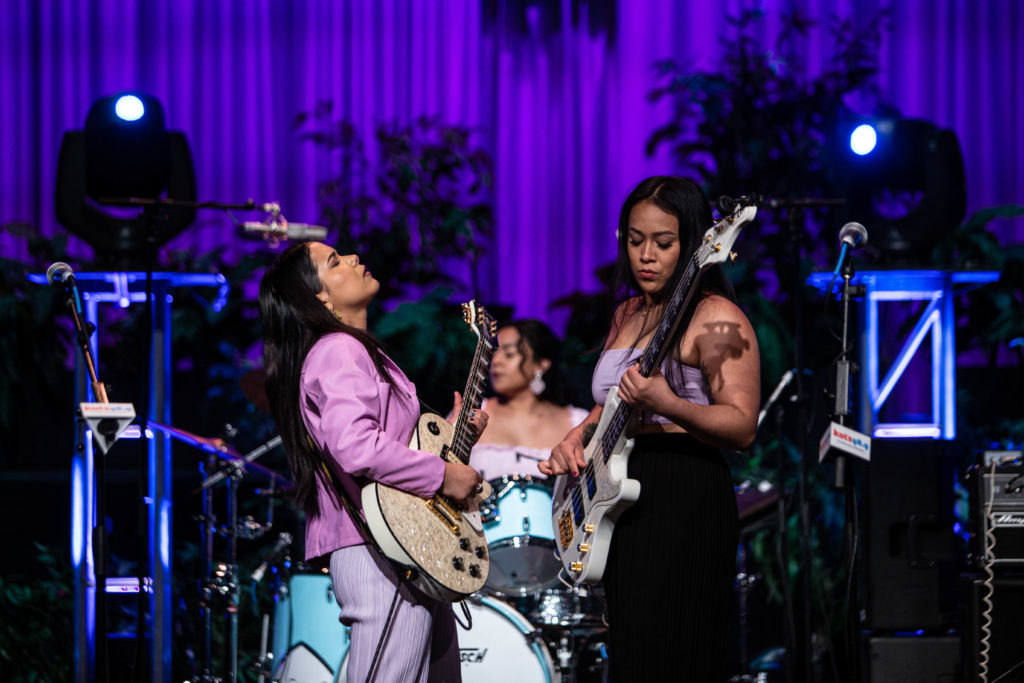By Jeff McCord
Siblings and adolescence aren’t always the best companions, but whatever their secret, the three Baltierra daughters seem to have weathered the storm with ease. Now in their twenties and just a few years apart in age, they’re still living under the same roof (Eldest Tiffany is about to be “the first bird to leave the nest,” says her little sister Tori), all while working and playing music together since their pre-teens. Clearly, the Tiarras (recently shortened from the Tiarra Girls) excel in harmony.

The closest thing I hear to an admission of any strife comes from Tori. “We have our ups and downs. We know how to push each other’s buttons in the best ways, and the worst ways, which is pretty funny.” But then, this: ”Performing and making music with your best friends and your sisters -the first women that you’ve ever known and ever loved – it’s a gift, really.”
The gift came from their DJ father, who brought them along to his gigs and exposed them to all kinds of music. Telepathic sibling vocals float over their songs, as Tiffany plays the bass, Sophia holds down the drums, and Tori’s singing and guitar anchor her songs. Despite being the youngest, she’s the one up front and center.
“It’s kind of a funny dynamic,” Tori explains. “Outside of the band, my sisters are overprotective of me. I am the baby. I look towards them for advice and leadership. But on stage, when we are in our music mode, the roles are reversed.”
The Tiarras have spent years sharing their music with an ever-growing fanbase, despite rarely venturing outside the state. (They have their first LA trip planned for later this year.)
Their name change became an obvious choice as their music began to grow up right alongside them. Early pop covers gave way to a more roots-oriented sophistication, without losing any of their dancefloor appeal.
“Ever since working with [Austin producer/musician] Michael Ramos,” says Tori, “We have leaned in towards more of the Latin percussion, playing around with that. Our music has kind of a ska, like a Latin reggae indie feel. And if you put our sound over it, it can instantly turn to cumbia. So it’s really fun to play with those sounds.”
The change is complimentary to a new songwriting direction. Call it more – aware.
Tori explains.”Around the time of the election in 2016, we were writing more music that was going towards the sound that we have now. And we had so many feelings about the whole atmosphere and growing up in general. We realized that a lot of people in our community were not voting. We’re putting a lot of the information that was really important to the side and falling into the traps that society has created for minorities. People are looking at us on a stage. And we should use our platform for something that’s bigger than us. And it just really felt so rewarding, being able to express ourselves in an unapologetic way and have others be inspired by it, and also collaborate with organizations like Planned Parenthood, Rock the Vote, Voto Latino. One of our songs is called ‘They Don’t See Us’; it’s a very kind of seventies Chicano soul feel. It makes you want to dance. But if you listen to the lyrics, it’s about feeling invisible in a world. They think we’re replaceable. That song was inspired by all of the feelings that came with the Black Lives Matter movement and gun violence, feeling invisible around the time of the pandemic.”
And for Tori, her song “Let Love Free” was also about the politics of the personal. “I remember I was working on a song around the time that I was going to come out to my grandmother. My sisters, they were always on my side. They loved me through everything. I’d come out to my parents. They received it well. They just were like, ‘we accept you and we’re just happy that you can love and we just want you to be honest with us.’ It had gotten to a point where I was sneaking around and not telling the truth because I had such a big fear that I wouldn’t be accepted. It was never really talked about in the household or in the culture. It’s like a taboo. So it felt really scary to be the first one to introduce this kind of thing into our own little world.”

“I had a coming out to do list and coming out to my grandmother was one of the last ones. She is very religious and very traditional. And I kind of used the song as a scapegoat to just express myself and, and hype myself up to do that. I sat down with her and I was like, ‘I have a girlfriend.’ I just started crying and she looked at me confused and she was like, ‘Why are you crying? I love you. I don’t care about that.’ It was so intense and beautiful to know that whatever she was holding on to, whatever tradition she was taught, she was willing to let it go for the one she loved. It was amazing. That gave us momentum to create the production around the song and a video as well, and open up our platform to uplift other LGBTQ voices.”
Tori relayed the story of a teenager who wrote her, explaining that “Let Love Free” had empowered the teen to come out to her own father.
Music is clearly a force for these three women whose love, kinship and onstage magic move people in all kinds of ways.
“That’s exactly what our music is for,” says Tori, “Allowing people to connect and share their truths.”